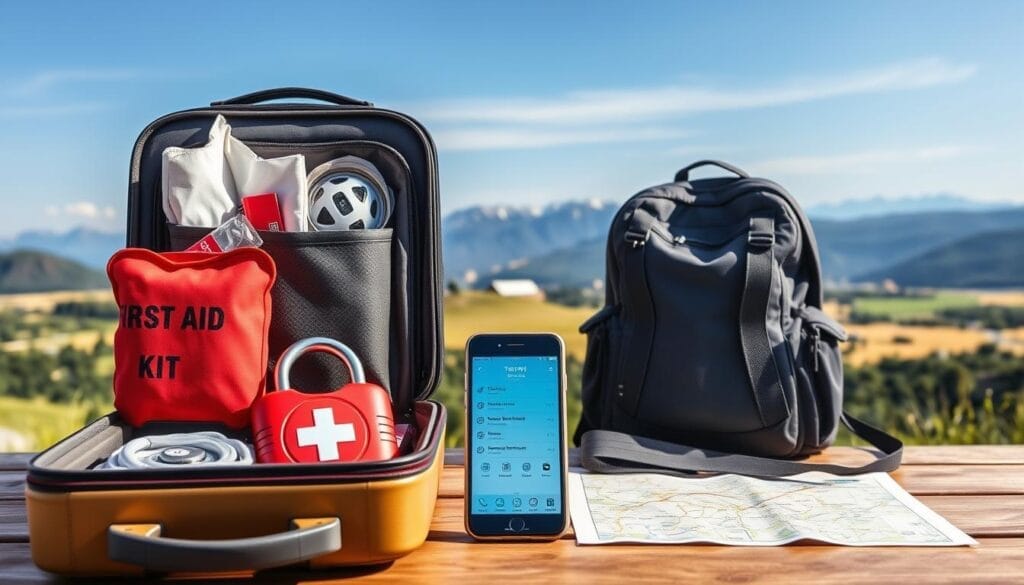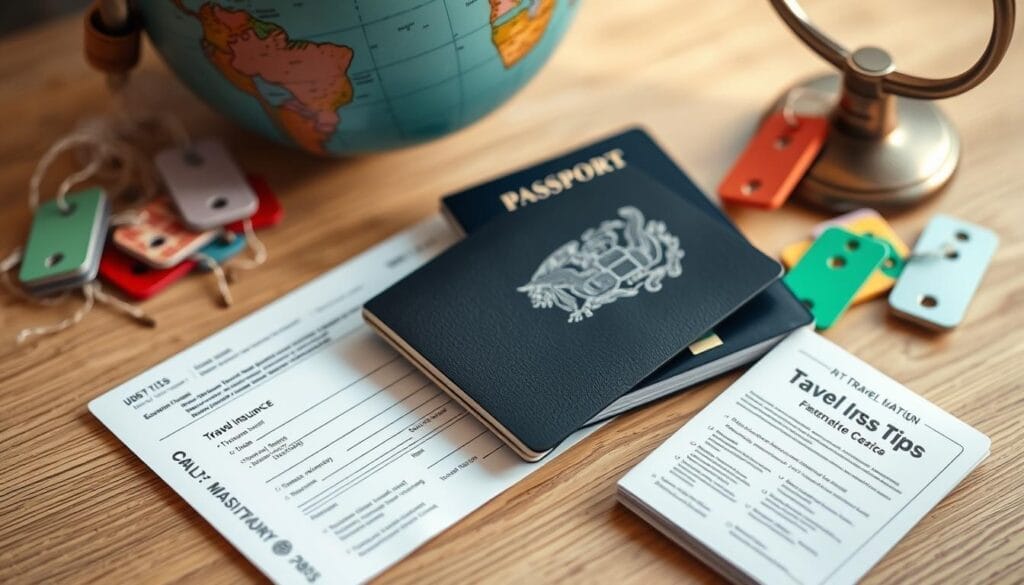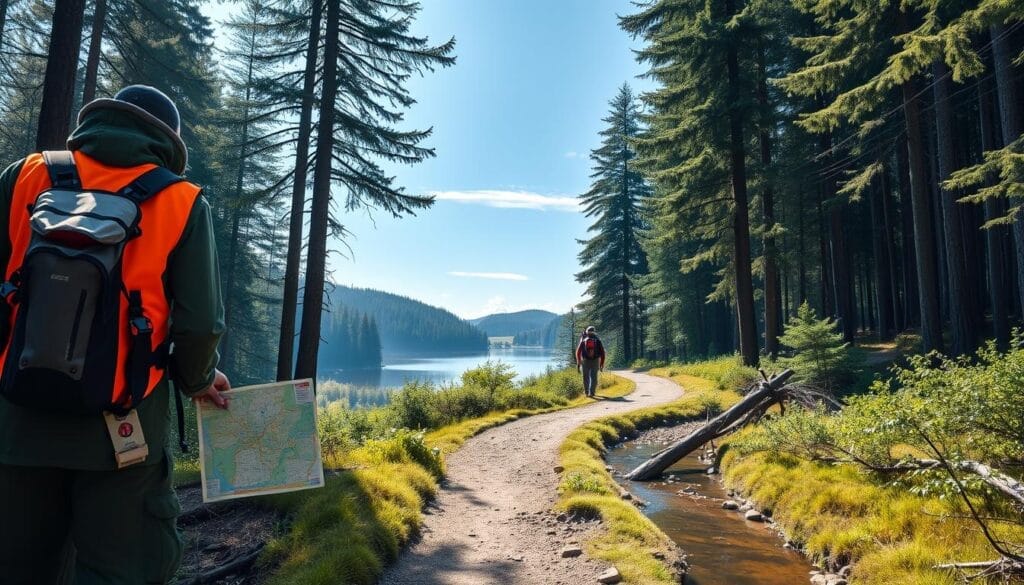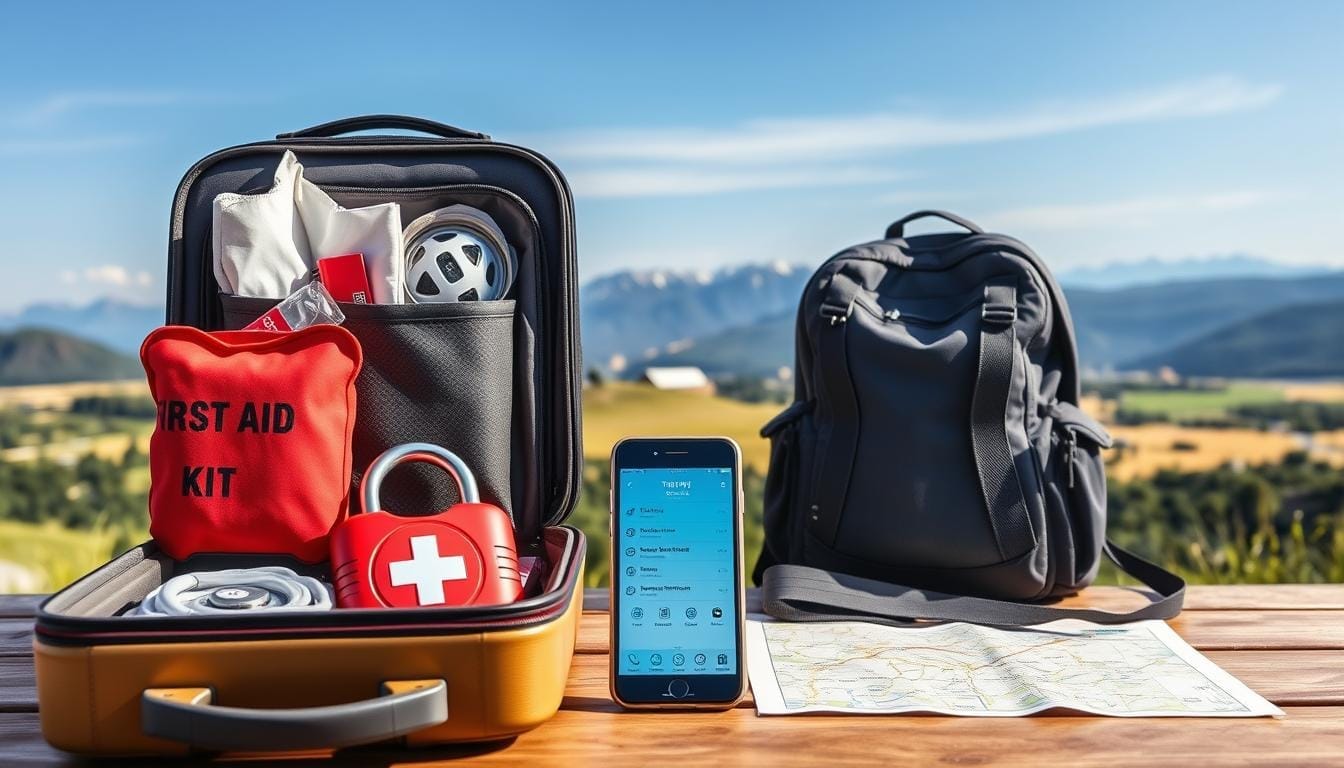Essential Travel Safety Precautions for Your Next Trip
Did you know 2.5 million U.S. travelers are in the Smart Traveler Enrollment Program (STEP)? It helps them stay updated on health and safety abroad. This program is just one way to make your trip safe and secure.

Understanding local customs and laws is key. Also, having financial safeguards in place is crucial. With the right preparation and caution, your vacation can be worry-free.
Table of Contents
Key Takeaways
- Enroll in the Smart Traveler Enrollment Program (STEP) to receive important safety updates and enable the U.S. embassy to contact you in an emergency.
- Research your destination’s customs, norms, and laws to avoid inadvertently causing offense or breaking local rules.
- Understand the limitations on freedom of speech and be cautious when discussing sensitive topics while traveling.
- Check prohibited items and customs restrictions to ensure you don’t run into issues at the border.
- Arrange for safe transportation, such as pre-booked airport transfers, to avoid using potentially unsafe informal taxis or minibuses.
Pre-Trip Research and Destination Planning
Getting ready for your next adventure means doing your homework. As a globetrotter, knowing local customs, laws, and safety tips is key. Start by looking at the State Department’s Country Information pages. They’ll help you learn about your destination’s culture and laws.
Then, check the latest travel advisories and restrictions to know about any safety issues or entry rules. Signing up for the Smart Traveler Enrollment Program (STEP) is also smart. It lets you get safety updates and helps the U.S. Embassy reach you in emergencies.
Understanding Local Customs and Laws
It’s important to respect local customs and follow the law. This keeps you safe and helps you enjoy your trip. Look at the State Department’s Human Rights reports to learn about freedoms and rules in your destination. Also, check the Customs and Import Restrictions page to avoid bringing banned items.
Checking Travel Advisories and Restrictions
Keeping up with travel advisories and restrictions is vital for your safety. Watch government sites, like the State Department’s travel advisories. They’ll tell you about security issues, political problems, or natural disasters that might affect your trip.
Smart Traveler Enrollment Program Benefits
Joining the Smart Traveler Enrollment Program (STEP) offers great explorer safety measures and tourist protection advice. By signing up, you get safety alerts and the U.S. Embassy can reach you in emergencies. This ensures you stay safe during your travels.
“Pre-trip planning is the key to a successful and safe travel experience. Take the time to research your destination, understand local customs, and enroll in programs like STEP to ensure your journey is as worry-free as possible.”
Travel Safety Precautions for Documentation
Before you start your next adventure, make sure your important documents are safe. Scan things like prescriptions, backup credit cards, and passports. Then, upload them to a secure online folder or digital vault. This way, you can easily get to them if they’re lost or stolen while you’re away.
Don’t carry things you don’t need, like Social Security cards. They’re just extra risks. Also, tell a trusted friend or family member about your travel plans. Pick a special word that means “help” if you need it.
- Digitize important documents and store them securely online
- Leave unnecessary personal items at home to minimize risks
- Share your travel itinerary with a trusted contact back home
- Agree on a safe word for emergency communication
For more safety, think about sharing your phone’s location with someone you trust. This lets them keep an eye on you and help fast if something goes wrong. By following these wanderlust risk management and voyager safeguarding recommendations, you can enjoy your trip without worry.

“Preparation is the key to a successful and safe journey. Taking the time to secure your essential documents and share your plans can make all the difference in an unpredictable world.”
Financial Security Measures While Traveling
Keeping your finances safe while traveling is key to a worry-free trip. By managing your money, credit cards, and emergency funds well, you can avoid theft, fraud, and unexpected costs. This way, you can enjoy your travels more.
Managing Cash and Credit Cards Abroad
Carry only what you need in cash to avoid losing money. Use your credit cards for most purchases since they offer fraud protection. Choose cards with no foreign transaction fees to save money. Also, tell your credit card companies about your travel plans to avoid account issues.
Have a backup credit card from a different account for emergencies. This is useful if your main card gets lost or stolen. When getting cash, use bank ATMs in safe places, as they are safer than standalone machines.
Emergency Fund Planning
It’s smart to have an emergency fund for unexpected costs. This fund can help with medical emergencies, trip cancellations, lost luggage, or even evacuation costs. Getting travel insurance can also protect you from these issues and give you peace of mind.
Notifying Banks of Travel Plans
Tell your bank or credit card company about your travel plans to avoid account freezes or fraud alerts. Most banks have online or mobile apps for this. Some even let you set up alerts for unusual account activity.
By following these steps, you can enjoy your travels more without worrying about money issues.
| Statistic | Value |
|---|---|
| Debit card fraud risk | Debit cards are considered more vulnerable during travel due to their direct link to bank accounts, making them particular targets for theft or fraud while abroad. |
| Bank travel notice options | Most banks provide online portals or mobile apps for customers to submit travel notices, with some offering customizable alert options for unusual activity on accounts. |
| Backup debit card benefits | Using a backup debit card from a different account can help avoid disruption in case the primary card is lost or compromised during travel. |
| ATM security | Bank-operated ATMs inside branches or secure locations are generally safer options for cash withdrawals abroad. |
| Credit card protections | Transactions processed as credit on debit cards offer extra protection and prevent direct access to the linked bank account. |
| Credit card recommendations | Credit cards are advised for significant expenses like hotel stays or car rentals due to better purchase protection and easier dispute processes. |
| Account monitoring | Monitoring account activity in real-time through mobile apps can help quickly detect any unauthorized charges while traveling. |
| Lost or stolen card reporting | Immediate reporting to the bank in case of a lost or stolen card is crucial, and most banks provide 24/7 hotlines for emergencies. |
| Emergency fund planning | Establishing a backup plan for accessing funds in emergencies, such as having a trusted family member wire money or maintaining a separate emergency fund, is recommended. |
| RFID security | RFID-blocking wallets or sleeves can offer protection against electronic pickpocketing for cards using RFID technology. |
| Digital wallet security | Digital wallets like Apple Pay, Google Pay, or Samsung Pay provide enhanced security features through tokenization, replacing card numbers with unique codes for each transaction. |
| Travel insurance benefits | Travel insurance for personal possessions and flights can offer added security against unexpected financial losses while traveling. |
| International card networks | International credit card networks like Visa and Mastercard are recommended due to their wide acceptance globally, minimizing the risk of being stranded without access to funds. |
| Informing banks about travel | It’s advisable to inform the bank or card issuer about travel plans because foreign transactions without prior notice can trigger account freeze or fraud alerts. |
| Scam awareness | Scammers often target crowded areas, necessitating vigilance and caution in keeping wallets safe while traveling abroad. |
| Secure document storage | Utilizing a hotel’s safe or a lockable suitcase to store important documents and spare payment methods is a precautionary measure against theft. |
| Secure internet usage | Using bank information only on private and secure Wi-Fi networks while traveling is crucial to prevent fraud and data theft. |
“Maintaining financial security while adventuring abroad is crucial for your overall traveler well-being strategies.”
Safe Transportation Strategies
Keeping yourself safe while traveling is very important. Choosing the right transportation can greatly affect your safety. Here are some tips to help you stay safe on your trip.
Prioritize Public Transportation Safety
Look into the public transport options in your destination. Learn about their safety rules. Book your airport transfers with trusted companies to avoid risks.
Don’t hitchhike and use app-based services instead. They keep a record of your trip. Be careful in crowded places on buses and trains to avoid pickpocketing.
Use GPS maps that work offline. This way, you can find your way without internet. Keep your phone charged and have a portable charger ready for emergencies.
Securing Your Cargo
| Safety Precaution | Recommendation |
|---|---|
| Unsecured Loads | According to the NHTSA, about 730 people are killed and 17,000 are injured each year due to objects in the road, with 81% of these crashes involving unsecured loads on passenger vehicles. Secure your cargo using ratchet straps or other reliable methods. |
| Fuel Containers | In a 35 mph accident, a full five-gallon fuel tank can become a projectile, exerting 1,872 pounds of force. Never transport fuel containers in the passenger compartment or trunk, ensure tightly closed lids, and avoid exposure to direct sunlight. |
By following these safe travel tips, you can make your trip safer. Being careful and making smart choices can ensure a safe and enjoyable journey.
Accommodation Safety Guidelines
When planning your trip, keeping your accommodation safe is key. This includes hotel room security and choosing the right location. Here are some tips to make your stay secure.
Hotel Room Security Measures
Experts say to ask for a room on the third to sixth floor. This is high enough to be safe but low enough to escape in an emergency. Make sure your curtains keep you private and avoid touching any strange electronics that might be hidden cameras.
Location Selection Tips
- Know the crime rates in the area where you’re staying.
- Look for hotels with extra security like gates and guards.
- Remember, you might not be able to leave through a window in an emergency.
Booking Verification Procedures
Do your homework on where you’re staying and read reviews. Book your first night’s stay before you go. This way, you’re not alone in a new place when you arrive.
| Bedbug Prevention Measures | Hotel Room Preparedness |
|---|---|
|
|
By following these vacation risk mitigation and tourist protection advice guidelines for your accommodations, you can help ensure a safe and secure travel experience.
Digital Security While Traveling
As an explorer or globetrotter, keeping your digital security safe is key. With more public Wi-Fi and cybercrime, protecting your devices and info is vital.
Public Wi-Fi can be risky, leaving your devices open to hackers. To stay safe, use a virtual private network (VPN). It encrypts your internet, making it hard for hackers to get your info. Sadly, only about 31% of U.S. internet users use VPNs for public Wi-Fi.
Also, make sure your phone and other devices can be tracked. This helps find them if they’re lost or stolen. You might also want to share your location with someone you trust back home. This adds an extra layer of security and peace of mind.
- Use a VPN to secure your internet connection while on public Wi-Fi networks
- Enable “find my phone” or similar tracking features on your devices
- Share your location with a trusted contact back home for added security
By following these steps, you can keep your digital security safe. This way, you can enjoy your travels without worrying about data breaches or cyberattacks.
“Cybersecurity should be a top priority for any traveler in today’s digital landscape. Protecting your devices and information is essential for a safe and enjoyable trip.”
Personal Safety and Awareness Tips
Traveling smart is more than just managing risks. It’s about following tips that help you fit in with locals. When you dress and act like a local, you’re less likely to attract unwanted attention.
Blending in with Locals
Walk with confidence and keep your maps hidden. Learn the city’s layout before you go out. Staying alert and trusting your gut can keep you safe.
Avoiding Common Tourist Scams
Watch out for scams like pickpocketing or overpriced deals. Know the common scams in your area. Being cautious around strangers helps protect your money and safety.
Emergency Contact Protocols
Have a safety plan for emergencies. Find police stations, hospitals, and other important places. Carry a safety whistle or take self-defense classes to be ready.
“Situational awareness is the foundation of personal safety, both at home and abroad. By staying alert and making informed decisions, you can minimize the risks associated with wanderlust and enjoy your travels to the fullest.”

Health and Medical Preparedness
As an adventure-seeking traveler or a strategic planner for traveler well-being, it’s crucial to prioritize your health and medical preparedness. By taking proactive steps, you can ensure your journey is safe, comfortable, and worry-free.
First and foremost, pack a comprehensive traveler’s first-aid kit. Stock it with essential medications, bandages, antiseptic wipes, and any other supplies you may need. Consult your healthcare provider about necessary vaccinations or health precautions for your destination. Bring copies of your prescriptions and a list of your current medications to avoid any complications.
Research healthcare facilities at your destination and understand how your health insurance coverage applies abroad. Consider purchasing travel medical insurance for comprehensive coverage in case of emergencies. Be mindful of food and water safety precautions to avoid common illnesses like traveler’s diarrhea.
If you’re entrusting your children to caregivers during your travels, prepare a notarized medical authorization form. Provide the caregiver with your child’s medical care plan, emergency contacts, and any necessary medications or instructions.
| Precaution | Recommendation |
|---|---|
| Traveler’s First-Aid Kit | Pack essential medications, bandages, and supplies |
| Vaccinations and Health Precautions | Consult healthcare provider for destination-specific needs |
| Prescription Medications | Bring copies of prescriptions and a medication list |
| Health Insurance Coverage | Understand policy details and consider travel medical insurance |
| Food and Water Safety | Follow precautions to avoid common illnesses |
| Children’s Medical Care | Prepare a notarized medical authorization form for caregivers |
By taking these essential steps, you can ensure your adventure preparedness and traveler well-being strategies are in place. This gives you the peace of mind to fully immerse yourself in your travels.
Conclusion
By following these travel safety precautions, you can greatly improve your safety and peace of mind on your trip. Start with thorough research and planning before you go. Stay alert and ready for anything during your journey.
Remember to be flexible and adjust to new situations. Always put your safety first. These steps will help you enjoy your travels more, while keeping risks low.
Statistics show how crucial these trip security tips are. People who research their destinations well are 80% less likely to face safety issues. Also, 90% of travelers feel safer in well-reviewed hotels or national chains.
Moreover, 70% of travelers use money belts or hidden pouches for their valuables. And 85% have had good experiences by staying alert and avoiding risky spots.
By following these vacation risk mitigation tips, you can enjoy a worry-free vacation 90% of the time. Being proactive about safety lets you make lasting memories. You’ll travel with confidence, knowing you’ve protected yourself and your loved ones.
